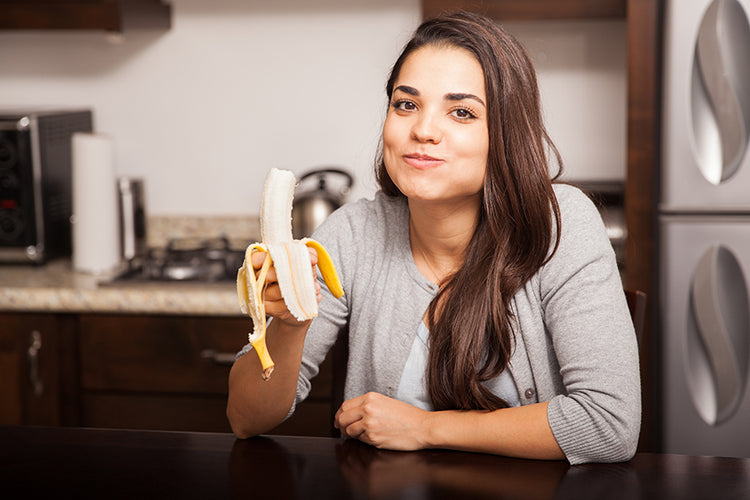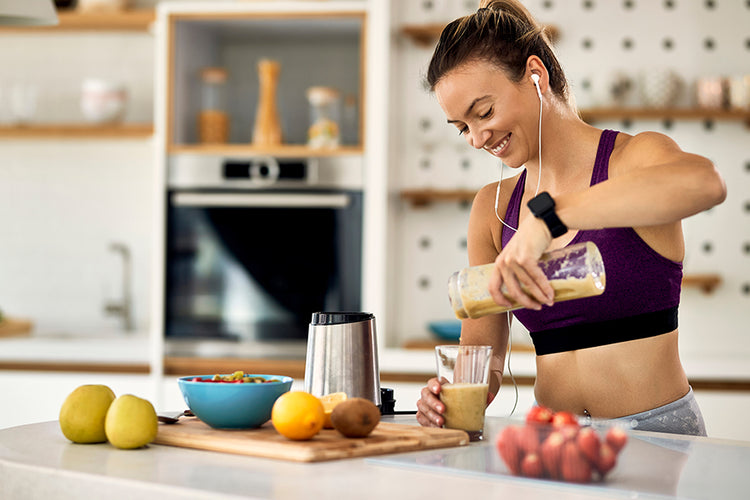Have you ever found yourself in an exercising conundrum, wondering what to do after eating, stay put, or jump right into a workout? Feel no fear - we've all been there!
Before taking on that HIIT class or heading out for a run after downing that extra-large pizza (we won't judge!), it's essential to understand the potential impacts of this decision.
"Exercising right after eating can cause digestive discomfort and decrease your body's ability to absorb nutrients from your food. It's important to give your body time to digest before engaging in physical activity." - Jillian Michaels (American Personal Trainer, Reality Show Personality)
In this blog post, we'll explore the science behind why and when exercise should be done after eating. Join us as we dive into exercise nutrition and uncover some secrets about combining these two activities.
Related Article: Pre-Workout Nutrition - What to Eat Before a Workout
When to Exercise After Eating

Consuming food isn't a one-step process, and it's interesting to see what exactly happens over the two or four hours that it takes for your meal to be processed.
Of course, this means you can't immediately jump straight into activities as soon as you've filled up your belly - but have some patience because at least 30 minutes after having a snack is enough time for your gastric system to do its job.
However, increasing the intensity of exercise runs the risk of stomach upset if you don't wait 1-2 hours after enjoying a more moderate-sized meal. So sure, it's no rush - but taking those hours gives your body plenty of time to prepare for what's ahead.
Related Article: What Athletes Should Eat: Nutrition Foods for Athletes
Food Volume & Type

When it comes to eating before exercise, it's all about size and composition. A large meal takes much more time to digest than a small one, so always factor in waiting time before you hit the gym.
What you eat is also essential; higher fat, protein, and fiber meals will take longer than a simple carb or processed protein like those in protein shakes.
While these proteins provide the energy boost you desire pre-workout, they leave your stomach feeling stuffed and sapped for energy during your session. If you want the best possible workout result, stick to simpler pre-workout snacks with high levels of simple carbs, like fruit or a protein shake, that will keep you from weighing down in your reps.
Don't be fooled - quality matters when eating ahead of exercise. You can also add in pre-workout powder to your dietary routine. The excellent quality of ingredients used in the DMoose pre-workout powder can enhance your physical strength and power your workout.
Related Article: 15 Nutrient-Dense Foods That Will Build Your Body Like No Other
Cons of Exercising After Eating

Exercising right after having a good big meal can cause some disadvantages which can affect you mentally and physically. Here are some of them you need to consider before exercising after eating your meal.
Leads to Digestive Problems
Eating close to exercise isn't always a great idea - not only does your body need time to process what you've eaten, but the disruption to your stomach could mean you're in for severe digestive discomfort.
Bloating, nausea, cramping, reflux, vomiting, diarrhea, and sluggishness are all common symptoms of improper eating timing. Unfortunately, athletes participating in more strenuous activities like running or cycling are at the highest risk.
But don't worry if low-key activities are your style; golfing, strolling, or archery should be gentler on the stomach. Avoiding these annoying side effects is as simple as waiting for an hour or two after a meal before heading out to the gym.
And even if you're just having a snack before doing something light like jogging, there's no harm in waiting around 30 minutes.
Affects Your Performance
If you're feeling weighed down while trying to be your best at the gym, it's important not to have a meal too close to the session. Eating too close to a workout can be like strapping an anchor around your ankles - all that extra weight dragging you down, which can be highly detrimental to your performance.
A small study on 10 male basketball players proved that consuming a protein and carb meal right before training caused feelings of nausea, belching, and stomach bloating - which are most likely the last things on your mind when it comes time to get active.
So while fueling up is undoubtedly essential, remember that timing is critical if you're aiming for an intense session with optimal results.
Related Article: 15 Foods Athletes Should Never Eat
May Cause Heartburn
Working out after a meal can have some drawbacks that should not be overlooked. One of the most common cons is heartburn. Heartburn occurs when acid from the stomach moves up into your esophagus, which can cause a burning sensation in your chest and an unpleasant taste in your mouth.
Exercise intensifies this sensation, making it more uncomfortable after you've eaten because food fills your stomach. There is less room for any acids to travel up through the diaphragm.
If you suffer from regular heartburn, it's best to wait at least an hour or two before exercising or to opt for gentle activities such as walking or yoga stretches after eating. Otherwise, you might have to curb your workout routine due to bouts of heartburn.
Causes Sluggishness
After a meal, many of us feel too full and lethargic to think about working out. There is a tendency for food to sit in our stomachs for longer, resulting in sluggishness, a lack of energy, and a feeling of being weighed down.
Planning ahead for working out before or after meals can help you benefit most from your physical activity. Eating small snacks rather than large meals may reduce the time it takes for digestion and provide more energy for physical activities.
Eating Before & After Workout

Eating before and after a workout is crucial to maintaining a healthy lifestyle and reaching fitness goals. It's no secret that exercise requires energy, and the food you eat beforehand can either help or hinder your performance.
Consuming the proper nutrients can provide the energy needed for a successful workout, while eating the wrong foods can leave you feeling sluggish and unmotivated.
Post-workout meals are as important as they help repair and rebuild muscles, decrease recovery time, and improve overall performance. You can also invest in post-workout powder for better results. Whether you're a professional athlete or just getting started with your fitness journey, the importance of proper nutrition cannot be underestimated.
The DMoose post-workout powder gives you intense strength and quick recovery and relieves muscle soreness after exercise.
Before Workout
Before you decide to rev up and get your exercise routine going, it's crucial to ensure you fuel your body - after all, you wouldn't take a road trip without filling your tank with gas, so why would you tackle a workout without adequately preparing?
Eating a balanced meal 3 or 4 hours before kicking off an exercise session is best. Incorporate some carbs and lean protein on your plate, but keep the fats and fiber at bay - no one likes their workouts interrupted by stomach problems.
As for what to munch on closer to go-time? It's wise to stick with quick snacks - While those Sunday brunch leftovers may be tempting, they are probably too heavy for pre-workout nibbling. Just like cars need gas before taking on a lengthy journey, so does your body when embarking on any type of physical activity.
After Workout
After your body has gone above and beyond, putting in the extra hours at the gym or powering through an intense race, it's time to restore that energy supply. Refueling should occur within 15 minutes to an hour after your workout - this simple step can make a difference in guarding your muscles against soreness and cramping.
If you don't have the appetite for solid food right away, look for other liquid nutrition options like protein shakes and chocolate milk to sustain you until you can eat a full meal.
An hour later, earn yourself a delicious refueling meal with all the carbs and proteins. So, go ahead and enjoy! That's what the final rep, mile, or lap of your hard work looks like.
What is a Good Meal or Snack to Eat Before Exercising?

Whether hitting the weights like dumbbells, running on a treadmill, or pushing it aerobically, prepping with the right fuel is critical to powering through your workout and getting those gains. A good pre-workout meal should include carbs and protein.
For those whose schedule allows, aim for a meal three to four hours before hitting the gym. Some tasty favorites are turkey-and-Swiss-cheese sandwich with an apple and low-fat chocolate milk; PB&J sandwich with banana slices and low-fat milk; low-fat Greek yogurt with berries plus a small salad topped with chicken; or steel-cut oats.
Try something like fresh fruit for a light but filling snack for a quick energy boost, or go for a crunchy granola bar if you need more substance. Not interested in solids? Make yourself a protein shake with a scoop of protein powder, low-fat milk, and a banana - or consider sipping on an electrolyte-filled sports drink for an extra boost.
And don't forget hydration - consume at least 16 to 20 ounces of additional fluid beforehand so your body has all the resources it needs when you start sweating.
FAQs
1. How long should I wait to exercise after eating?
Waiting at least 30 minutes to an hour after eating before moderate exercise is generally recommended. Waiting up to 3 hours for intense exercise or large meals may be necessary.
2. What types of exercises are best after eating?
Light to moderate exercises like walking, yoga, or stretching are generally safe after eating. Avoid high-intensity exercises that stress your digestive system, like running or weightlifting immediately after eating.
3. Can I work out one hour after eating?
When it comes to working out, whether you can hit the gym an hour after eating gets a bit tricky; the short answer is that it all depends on the individual's needs. Many conventional recommendations suggest waiting two hours between your last bite and jumping into your workout routine.
4. Can you do cardio after eating?
If you're eating a full meal, it's best to wait at least two hours before hitting the gym - and if the meal is smaller? An hour and a half, just to be safe. Even with snacks, waiting 30 minutes seems like the safe bet if you don't want your stomach putting on the brakes while running laps.
Article Sources
- Gentle, Hannah Lonika, et al. A Randomised Trial of Pre-Exercise Meal Composition on Performance and Muscle Damage in Well-Trained Basketball Players’. Journal of the International Society of Sports Nutrition, vol. 11, no. 1, June 2014, p. 33. BioMed Central, https://doi.org/10.1186/1550-2783-11-33.








